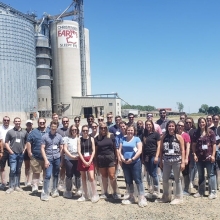Chamber Federation launches legislative agenda
By Chamber President Doug Loon
Strike up a conversation with any business owner on the challenges to growing jobs in Minnesota, and the themes ring familiar.
High taxes hinder growth. Access to quality health care at an affordable price. The increasing number of government-mandates on employee benefits. Shortage of skilled workers.
Businesses of all types and sizes feel these stresses. Job-creators across the state hold their collective breath as the 2020 Legislature gets underway. Listen to those on the front lines as we seek ways to lessen these headwinds and create economic opportunity for all Minnesotans.
St. Cloud and River Heights are among the 40-plus members of the Minnesota Chamber Federation, which unites and amplifies the voice of local chambers by advocating for policies to grow business in every corner of the state. Together with the Minnesota Chamber, the Federation is launching its 2020 agenda as the Legislature gets underway.
Workplace regulations are center stage for St. Cloud businesses, says Teresa Bohnen, president of the St. Cloud Area Chamber of Commerce. Among their concerns is the broad wage theft law that, among other things, penalizes employers for unintentional payroll errors. “It seemed like the wage theft law sailed through last year without much consideration of the unintended consequences. Now we are requiring all businesses to absorb additional costs related to excessive paperwork and compliance to regulations that the vast majority of them were already following.”
The Federation will pursue modifications in the wage theft law.
We also continue to oppose “one size fits all” state mandates that limit employers’ ability to design competitive benefit packages for their employees. The patchwork of local mandates is cited in Inver Grove Heights. “Many small businesses don’t just work in one community,” says Brenda Dietrich, co-owner of Hardline Concrete & Masonry. “When cities make their own legislation, such as mandating wages and benefits, it is a hindrance to small businesses.”
Kari Rihm, president and chief executive of Rihm Family Companies, underscores the most widespread difficulty facing businesses: Finding workers. “Too few people are going into trades, and too many people are retiring from them.” she says. “It’s no secret. Businesses will be stymied if they can’t hire enough experienced, skilled workers.” The Federation continues to seek systemic reforms to raise all student achievement, ensuring every high school graduate is ready for postsecondary education or a career.
Local employer concerns resonate with Jennifer Gale, president of the River Heights Chamber. “We need to align our state’s legislative policies with our desire to keep Minnesota competitive,” she says. “Local chambers can work side by side with our legislators to connect them with business owners who know firsthand the everyday challenges.”
Conforming Minnesota law with the federal Section 179 tax code tops our tax agenda to allow immediate expensing equipment purchases. Rounding out our priorities are requiring a cost-benefit analysis as part of any proposal to add insurance mandates to state law and supporting environmental policies that drive private investment in Minnesota while helping employers reduce environmental impacts.
Federation partners have collectively advanced employer priorities for more than a decade; they represent 43 communities and 21,000-plus businesses.
If you want to be in the know – and lend your collective voice to help improve the lives of all Minnesotans – I encourage you to become a member of your local chamber or the Minnesota Chamber. Sign up for email updates throughout the legislative session to keep abreast of what is happening at the Capitol.
As one employer, your voice can be a whisper. Combine it with hundreds of others, and your voice becomes a roar.


